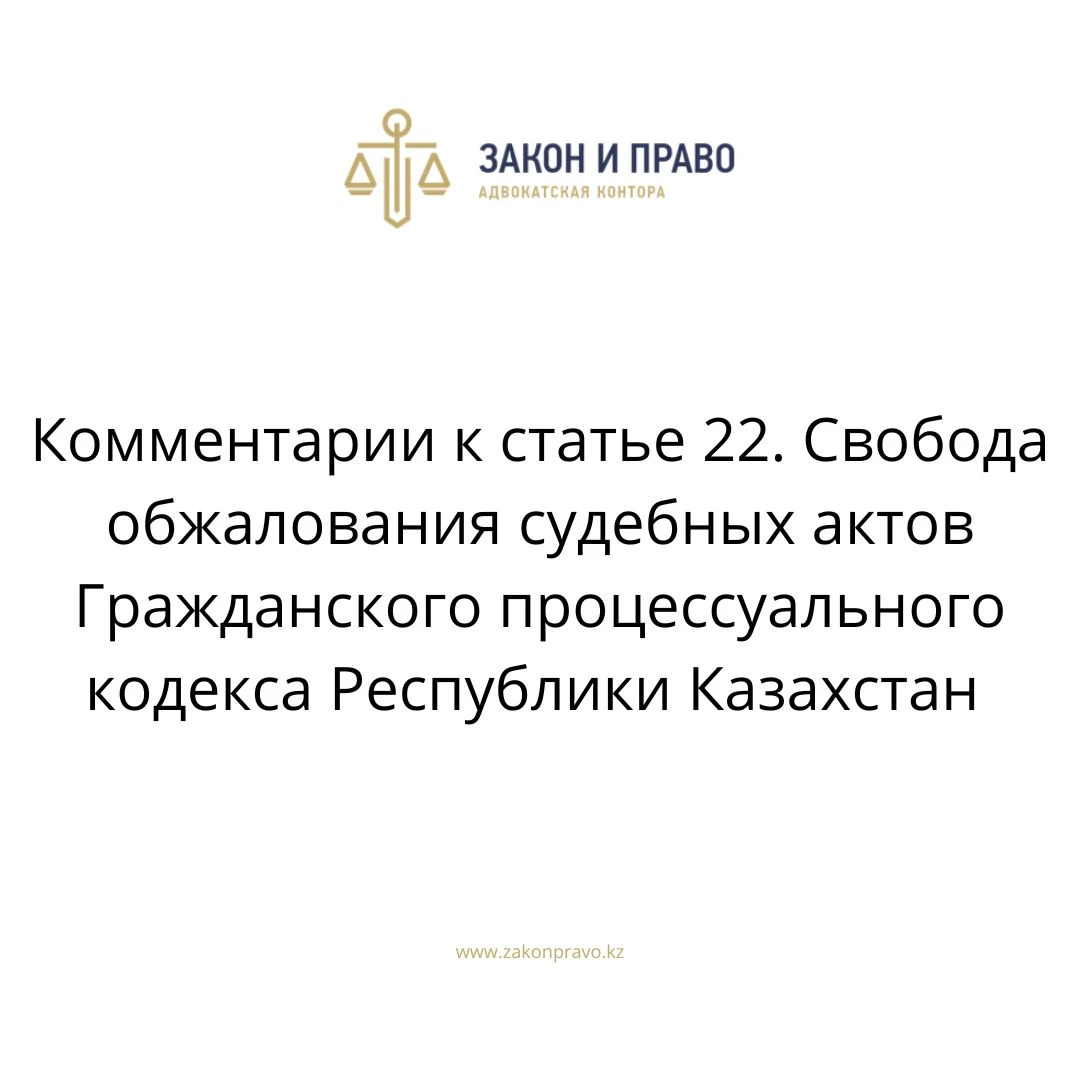Comments on article 22. Freedom of appeal against judicial acts of the Civil Procedure Code of the Republic of Kazakhstan
Judicial acts may be appealed in accordance with the procedure established by this Code by persons participating in the case, as well as by persons in respect of whose rights and obligations judicial acts have been issued by the court.In the commented article, the right to appeal judicial acts in accordance with the procedure established by the CPC guarantees the persons participating in the case the exercise of the constitutional right to protect rights, freedoms and legally protected interests.The procedure for reviewing judicial acts in the CPC is provided for by the court itself, which issued the decision., so it is with the higher court.Judicial acts that have not entered into legal force may be reviewed on appeal by filing an appeal (private) complaint or appeal (private) protest by the prosecutor to the judicial board for civil cases of the regional and equivalent courts. Decisions of the Astana City Court rendered in the first instance may be appealed (protested) on appeal to the specialized judicial board of the Supreme Court (Article 402 of the CPC).
An appeal or protest against judicial acts that have not entered into legal force is filed with the court that issued these judicial acts. The court must take certain actions, namely to check whether the complaint or protest meets the requirements of the CPC, whether the deadlines for filing a complaint or protest have been missed, and whether the state fee has been paid. After these actions are completed and the time limit for appeal expires, the court sends the case along with the complaint or protest to the appeals board.The court that issued the decision has the right to cancel the decision itself, rendered by it in the order of simplified (written) proceedings, in absentia, if the defendant's application has been received (Articles 147, 265 of the CPC). The court also has the right to cancel the court order issued by it (Article 142 of the CPC).The review of a decision that has entered into legal force by a higher court is carried out in cassation by filing a cassation complaint about disagreement with the judicial acts issued or filing an application for the annulment of a court decision on newly discovered or new circumstances to the court that issued the court decision.A petition, a protest against rulings, and decisions of the court of appeal may be filed within six months from the date of their entry into force. If the time limit for appealing judicial acts is missed, the petition may be filed with the court of cassation after the court of first instance has considered the application for reinstatement of the time limit for appeal, and in case of refusal - after consideration of a private complaint, protest, appeal by the court of appeal.The review of judicial acts that have entered into force is an exceptional stage of the civil process, therefore, court orders that have entered into force, rulings of the court of first instance, with the exception of rulings, cases that block the further movement of cases are not subject to cassation review. Objections to such definitions may be included in petitions filed in cassation.In addition, Part two of Article 434 of the CPC establishes restrictions on the cassation review of judicial acts in certain categories of cases.Decisions, rulings and resolutions that have entered into legal force may be reviewed under newly discovered or new circumstances in the presence of the circumstances specified in Article 455 of the CPC. The review of rulings, decisions, and decisions of the appellate and cassation instances, which amended the decision of the court of first instance or issued a new decision, based on newly discovered or new circumstances, is carried out by the court that changed the decision or issued a new decision.
LIBRARY OF THE SUPREME COURT OF THE REPUBLIC OF KAZAKHSTAN
Astana, 2016
UDC 347 (574)
By 63
ISBN 978-601-236-042-4
Constitution Law Code Standard Decree Order Decision Resolution Lawyer Almaty Lawyer Legal service Legal advice Civil Criminal Administrative cases Disputes Defense Arbitration Law Company Kazakhstan Law Firm Court Cases


